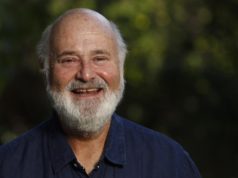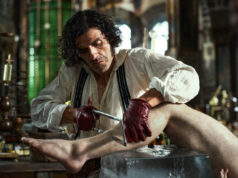I had a lot of leftover thoughts about Inglourious Basterds that I didn’t have the space to share in my review, so I thought I’d air them here.
As you can imagine, some movie critics more serious-minded than myself have taken Tarantino to task for being so cavalier with a piece of history as weighty as World War II. The director’s self-aggrandizing offscreen behavior certainly hasn’t won him too many fans or reversed his image as a guy who simply won’t grow up and make movies about “real life,” or even acknowledge its existence. Yet this thought-provoking article by Dennis Lim argues that Tarantino is actually underrated now, having been overrated in the wake of Pulp Fiction. I certainly take Lim’s point that Tarantino’s films in this decade don’t reference other movies any more than Pulp Fiction or Reservoir Dogs did. I also note that he used the word “chutzpah” just like I did in describing the filmmaker’s audacity. I guess we both thought the Yiddish word was appropriate to this situation.
Lim’s piece raises a question: How do we evaluate directors who shake the world so early in their careers? What are we supposed to do with everything they do afterward? Most filmmakers don’t encounter success early. It’s much more common to have a career in which a director learns the ropes early and then matures and produces deeper, more meaningful works. When a filmmaker sets the screen ablaze with their first or second film, we want all their other movies to be even better. So it’s been with Tarantino, Kevin Smith, Wes Anderson, Tim Burton, M. Night Shyamalan, and a whole host of others. They all caught our eye not just because of their talent but because of their unique ways of seeing the world. Then what? If they repeat themselves in terms of tone or subject matter (Anderson) we say they’ve grown stale. If they make a radical break from what they’ve been doing (like Scorsese did with The Age of Innocence), we’re often confused. One yardstick I use for many movies is asking myself whether I’d feel differently about the film if I didn’t know who the director was. That’s a way to try to objectively measure what a movie does or doesn’t do. The thing is, though, nobody sees movies in a vacuum. The director and even more often the actors involved with a movie generate a set of expectations in your mind, not just about how good the movie will be, but also what kind of fundamental experience the movie will be. Trying to see every movie from both viewpoints is one of my job’s ongoing challenges.
As for the moral objections of using World War II for lowbrow entertainment, there’s a long, proud tradition of filmmakers doing so. In my review, I named The Guns of Navarone (which, if you’ll remember, Jules Winnfield mentions during a funny rant in Pulp Fiction, which you can find at the 7:30 mark of this clip). If you want a delightfully absurd and highly enjoyable WWII popcorn flick, try John Huston’s 1981 film Victory, with Sylvester Stallone and Michael Caine joining Pelé and a bunch of other great soccer players as prisoners of war taking on the Nazis in a soccer game. Another movie that makes a great companion piece to Inglourious Basterds is Paul Verhoeven’s Black Book, which came out in America two years ago. It shares Basterds‘ depraved view of human nature, and it has some great set pieces as well as a star-making turn by Carice van Houten as the film’s heroine. Yet it’s a less successful work than Tarantino’s, primarily because it trips up during its more serious moments.
There’s an intriguing thread in Inglourious Basterds about how film itself can be a weapon in wartime. The Nazi propaganda movie being premiered is certainly intended to rouse the German audience. (Amusing note: The film within the film was directed by Basterds co-star Eli Roth. The German crew members who worked on it were terrified that they’d be tossed in jail, because producing Nazi propaganda is a crime in Germany.) Shortly after that, film becomes a weapon in the most literal sense, because the secretly Jewish French movie theater owner Shosanna Dreyfus a.k.a. Emmanuelle Mimieux is hatching her own plot to kill her Nazi guests by burning her theater down, using her private stock of films as kindling. Like his critique of cinema violence, Tarantino doesn’t really sustain this idea, but I found its presence intriguing.
Mélanie Laurent, who plays Shosanna, is the granddaughter of a Holocaust survivor, so she was pretty keen on playing a character who takes revenge on the Third Reich.
I also didn’t have the space to discuss the character of Lt. Archie Hicox (Michael Fassbender), the debonair movie critic-turned-British spy who’s sent to rendezvous with Bridget because he knows the German film industry. Hicox is cool as can be in that British stiff-upper-lip sort of way, and he makes a point of delaying the start of the big shootout so he can finish his drink. (“There’s a special place in hell reserved for people who waste perfectly good Scotch.”) He’s a pretty memorable supporting character here. I saw the film in a screening room full of movie critics, and there was a fair amount of appreciative laughter when the guy revealed his civilian profession.
Mike Myers has a bizarre cameo as the British general (with a combover) who gives Hicox his mission. Rod Taylor, the Australian actor who starred in such films as Giant, Separate Tables, and Hitchcock’s The Birds, also appears in that same scene as Winston Churchill. The film’s voiceover narration is provided by Samuel L. Jackson, in a deliberately anachronistic touch.










